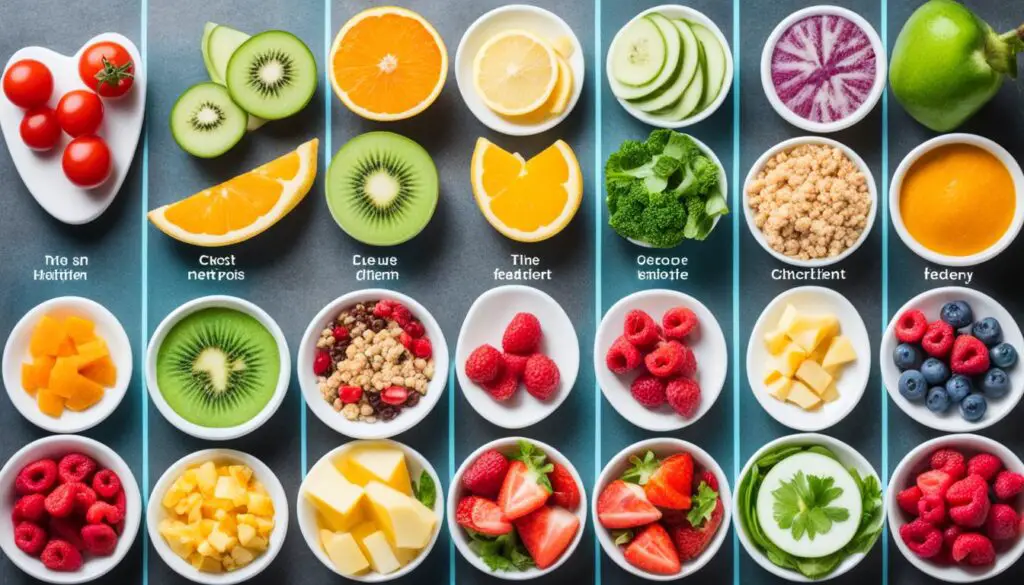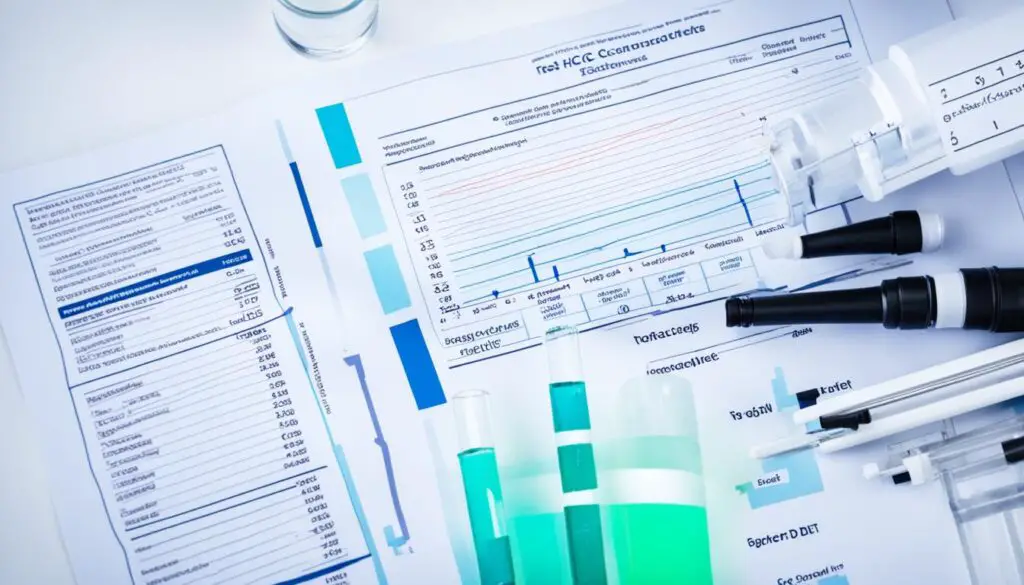Have you ever wondered about the psychological impact of prolonged HCG dieting? Is there more to this weight loss protocol than just shedding pounds? Let’s delve into the emotional consequences and mental health implications of following an extended HCG diet.
While the HCG diet claims to promote rapid weight loss without hunger, it is essential to consider the psychological challenges of sustained HCG dieting. The severe calorie restriction and limited food choices may have a significant impact on your mental well-being. So, what are the cognitive and emotional factors at play when following a prolonged HCG diet? Let’s find out.
Key Takeaways
- The HCG diet combines very low-calorie intake with the hormone HCG for weight loss.
- Scientific evidence does not support the claimed weight loss mechanisms of HCG on its own.
- The severe calorie restriction and limited food choices can lead to nutrient deficiencies.
- Long-term HCG dieting can have psychological risks and challenges, such as feelings of deprivation and potential for disordered eating behaviors.
- Prioritizing overall mental well-being is crucial when considering a long-term HCG diet.
The Science Behind the hCG Diet
The hCG diet is a weight loss approach that utilizes the hormone hCG. This hormone is naturally produced at high levels during early pregnancy. Proponents of the diet claim that hCG enhances weight loss by reducing appetite and promoting fat burning. However, scientific research has revealed a different story.
Studies comparing the effects of hCG and placebo injections have shown that weight loss on the hCG diet is primarily due to drastic calorie restriction rather than the effects of hCG itself. In fact, the weight loss between hCG and placebo groups is similar, indicating that hCG does not significantly enhance fat loss.
Furthermore, there is no scientific evidence to support the claims that hCG prevents muscle loss or boosts metabolism. In reality, severe calorie restriction can lead to decreased muscle mass and a slowdown in metabolism.
It’s important to understand that the weight loss mechanisms of the hCG diet are not scientifically supported. The primary factor contributing to weight loss on this diet is the severe calorie restriction it entails.
Table: The Science Behind the hCG Diet
| Aspect | Scientific Evidence |
|---|---|
| Weight loss mechanisms of hCG | No scientific support; primarily due to calorie restriction |
| Effect of hCG on appetite reduction | No significant effect; appetite reduction primarily related to calorie restriction |
| hCG’s effect on body composition | No evidence of prevention of muscle loss |
| Muscle loss on the hCG diet | Severe calorie restriction can lead to decreased muscle mass |
| Metabolic slowdown on the hCG diet | Severe calorie restriction can result in a slowdown in metabolism |
Despite the claims made about the hCG diet, the scientific evidence does not support its effectiveness for weight loss beyond the calorie deficit achieved through severe restriction. It’s important to approach weight loss with evidence-based methods and prioritize overall health and well-being.
The Rules and Phases of the hCG Diet

Understanding the Phases of the hCG Diet
The hCG diet is divided into three distinct phases: the loading phase, the weight loss phase, and the maintenance phase. Each phase has its own set of rules and guidelines that are essential to follow for a successful and effective weight loss journey.
The Loading Phase
In the loading phase of the hCG diet, individuals are encouraged to indulge in high-fat, high-calorie foods for a period of two days. This phase serves to build up the body’s fat stores before transitioning to the calorie-restricted weight loss phase. During the loading phase, hCG injections are typically initiated to kickstart the body’s metabolism.
The Weight Loss Phase
The weight loss phase is the core component of the hCG diet and involves a strict calorie restriction of approximately 500 calories per day. This phase can last anywhere from three to six weeks, depending on individual weight loss goals. Continuation of the hCG injections is essential during this phase to support fat burning, appetite suppression, and muscle preservation.
The Maintenance Phase
The maintenance phase marks the transition from the weight loss phase to a more sustainable eating pattern. This phase lasts for an additional three weeks, during which food intake is gradually increased while still avoiding certain foods such as sugar and starch. The maintenance phase aims to stabilize weight loss and solidify healthier eating habits for long-term success.
A Comprehensive Meal Plan
Throughout all phases of the hCG diet, a specific meal plan is recommended to ensure optimal results. The meal plan typically consists of two meals per day, each including lean protein, vegetables, a serving of fruit, and a piece of bread. Butter, oils, and sugar should be avoided, while water, coffee, and tea are permitted.
| Protein | Vegetables | Fruit | Bread |
|---|---|---|---|
| Chicken | Spinach | Apple | Melba Toast |
| Beef | Asparagus | Orange | Grissini Breadstick |
| Fish | Cabbage | Strawberries | Rye Bread |
| Shrimp | Cauliflower | Grapefruit |
It is important to adhere to the approved foods list and portion sizes outlined in the hCG diet guidelines to maximize the benefits of the protocol.
By diligently following the rules and phases of the hCG diet, individuals can experience significant weight loss and achieve their desired goals. However, it is always recommended to consult with a healthcare professional before starting any new diet or weight loss program to ensure suitability and safety.
Scam Products on the Market
When it comes to hCG products, it is essential to be cautious and discerning. Many hCG products available on the market are labeled as homeopathic, which means they do not actually contain real hCG. Unlike these over-the-counter (OTC) homeopathic hCG products, real hCG is only available through a doctor’s prescription and is administered as a fertility drug or hormone treatment.
The safety of hCG products is a significant concern. OTC hCG products are unregulated, meaning their ingredients are unknown and potentially unsafe for consumption. These products may not only be ineffective for weight loss but could also pose risks to your health.
The FDA has not approved hCG as a weight loss aid and has raised concerns about the safety of hCG products. This lack of regulation and oversight means that it is crucial to exercise caution when purchasing hCG products online. Consulting with a healthcare professional before starting any weight loss regimen is recommended to ensure your safety and the effectiveness of your weight loss journey.
Safety and Side Effects of the hCG Diet
The hCG diet has been the subject of safety concerns, prompting a warning from the FDA. The main cause for concern lies in the severe calorie restriction imposed by the diet, which limits daily intake to only 500 calories. This extreme level of calorie restriction can lead to various side effects that include headaches, depression, and fatigue. In some cases, there have been reports of serious adverse reactions, such as blood clots. One case study detailed a woman who developed blood clots in her leg and lungs while following the hCG diet, suggesting a strong likelihood that the diet was the direct cause.
It is crucial to thoroughly consider these safety concerns and potential side effects before embarking on the hCG diet. The risks associated with severe calorie restriction should not be taken lightly. The FDA warning serves as a reminder that this diet may pose significant health risks to individuals.
Image:
Lack of Scientific Evidence and Expert Opinion on the hCG Diet

When considering the hCG diet, it is important to note the lack of scientific evidence supporting the efficacy and safety of this weight loss approach. A comprehensive review published in the Journal of Dietary Supplements in 2016 concluded that there is no scientific basis for the hCG diet, and it may do more harm than good. This lack of scientific support raises doubts about the effectiveness of the hCG diet as a long-term weight loss solution.
Additionally, registered dietitians, who are experts in the field of nutrition, unanimously agree that the hCG diet is dangerous and should not be recommended. The severe calorie restriction and limited food choices associated with this diet can lead to nutrient deficiencies and have negative implications for long-term weight management. Consulting with a healthcare professional or registered dietitian is crucial to explore evidence-based weight loss methods rather than relying on the hCG diet.
As the image above depicts, the lack of scientific evidence on the hCG diet is further highlighted. The chart displays the results of multiple studies, consistently showing limited and inconclusive findings regarding the hCG diet’s effectiveness.
Psychological Risks and Challenges of Long-Term HCG Dieting
Long-term hCG dieting presents significant psychological risks and challenges. The severe calorie restriction and limited food choices involved in this diet can lead to feelings of deprivation, hunger, and dissatisfaction, negatively impacting mental well-being. The focus on rapid weight loss and strict adherence to the diet’s rules may also contribute to an unhealthy relationship with food and potential for disordered eating behaviors.
The psychological consequences of long-term hCG dieting can have detrimental effects on overall mental health and well-being. The constant focus on restrictive eating patterns and the pressure to achieve weight loss goals can create a cycle of guilt, shame, and self-criticism. These emotional consequences can further escalate into negative body image, low self-esteem, and even depression.
It is essential to consider the potential psychological risks before embarking on a long-term hCG diet. Mental well-being should be a top priority throughout the weight loss journey. This includes cultivating a positive relationship with food, promoting self-compassion, and seeking support from healthcare professionals or registered dietitians who can provide guidance and assistance in maintaining a balanced and healthy approach to weight loss.
The Psychological Risks
Long-term hCG dieting can pose various psychological risks, including:
- Feeling of Deprivation: The severe calorie restriction and limited food choices can lead to feelings of deprivation and constant hunger, which can negatively impact mood and emotional well-being.
- Emotional Consequences: The intense focus on weight loss and strict adherence to the diet’s rules can result in emotional distress, including guilt, frustration, and disappointment, leading to a negative impact on overall mental health.
- Disordered Eating Behaviors: The rigid nature of the hCG diet may contribute to the development of disordered eating patterns, such as obsessive food thoughts, restrictive eating, and unhealthy compensatory behaviors.
The Importance of Mental Well-being
Prioritizing mental well-being is crucial when considering any long-term diet plan, especially one as restrictive as the hCG diet. this may include:
- Seeking Professional Support: Consulting with a healthcare professional or registered dietitian who specializes in disordered eating and weight management can provide valuable guidance and support in navigating the challenges and potential risks associated with the hCG diet.
- Building a Healthy Relationship with Food: Focusing on intuitive eating and developing a positive and balanced relationship with food is essential for long-term mental well-being and sustainable weight management.
- Fostering Self-Care: Engaging in activities that promote overall well-being and self-care, such as regular exercise, adequate rest, and stress management, can positively impact mental health while on a weight loss journey.
“It is important to prioritize overall mental well-being throughout the weight loss journey.”
By understanding and addressing the psychological risks and challenges associated with long-term hCG dieting, individuals can make informed decisions about their weight loss journey. Mental well-being is a fundamental aspect of overall health, and seeking a balanced and sustainable approach to weight loss is paramount.
The Importance of a Sustainable Approach to Weight Loss
The hCG diet, with its severe calorie restriction and limited food choices, is not a sustainable approach to weight loss. While it may lead to short-term weight loss, it often results in weight regain once the restrictive phase is over. To achieve long-term weight management and ensure lasting results, it is crucial to adopt sustainable and evidence-based methods that prioritize overall health and well-being.
One key component of sustainable weight loss is following a balanced and varied diet. Instead of severely restricting calories or eliminating entire food groups, focus on consuming a wide range of nutrient-dense foods. Emphasize fruits, vegetables, whole grains, lean proteins, and healthy fats in your diet. These foods provide essential nutrients and promote satiety, helping you maintain a healthy weight in the long run.
Engaging in regular physical activity is another crucial aspect of sustainable weight management. Aim for at least 150 minutes of moderate-intensity exercise or 75 minutes of vigorous-intensity exercise each week. Incorporate a mix of cardio, strength training, and flexibility exercises to maximize the benefits and support overall health.
It is also important to address any underlying factors that may contribute to weight gain or hinder weight loss. Factors such as stress, emotional eating, sleep quality, and hormonal imbalances can all impact weight management. Consulting with a healthcare professional or registered dietitian can provide personalized guidance and support in identifying and addressing these factors.
By adopting a sustainable approach to weight loss, you can achieve and maintain your desired weight in the long term. Focus on nourishing your body with a balanced and varied diet, engaging in regular physical activity, and addressing any underlying factors that may contribute to weight gain. Remember, sustainable weight loss is not a quick fix but a lifelong journey towards a healthier and happier you.
The Potential Dangers and Risks of Very Low-Calorie Diets
Very low-calorie diets, such as the hCG diet, pose significant risks and dangers to overall health. The severe calorie restriction involved in these diets can lead to nutrient deficiencies, depriving the body of important macro- and micronutrients necessary for optimal functioning. This deficiency can have negative implications for overall health, weakening the immune system and increasing the risk of developing other diseases, such as cancer, diabetes, and heart disease.
Additionally, very low-calorie diets can have a detrimental impact on metabolism and hormones. The body’s metabolism, responsible for converting food into energy, can slow down in response to prolonged calorie restriction. This slowdown can make it more challenging to maintain weight loss in the long term, as the body becomes more efficient at conserving energy.
The hormonal changes that occur during very low-calorie diets can also be unfavorable. Hormones play a crucial role in regulating various bodily functions, including hunger, metabolism, and mood. Severe calorie restriction can disrupt the delicate balance of hormones, leading to irregularities in appetite regulation, mood swings, and decreased energy levels.
It is important to consider these risks and prioritize overall health when contemplating any low-calorie diet approach. Instead of opting for extreme calorie restriction, it is advisable to focus on a balanced and varied diet that provides an adequate intake of essential nutrients. Consulting with a healthcare professional or registered dietitian can provide guidance on safe and effective weight loss strategies that prioritize long-term health and well-being.
Potential Risks of Very Low-Calorie Diets
| Risks | Explanation |
|---|---|
| Nutrient deficiencies | Calorie-restricted diets may lack essential macro- and micronutrients, increasing the risk of deficiencies. |
| Increased risk of diseases | Very low-calorie diets can contribute to the development of diseases, such as cancer, diabetes, and heart disease. |
| Metabolic slowdown | The body’s metabolism may slow down in response to prolonged calorie restriction, making weight maintenance challenging. |
| Hormonal imbalances | Severe calorie restriction can disrupt the balance of hormones, leading to irregularities in appetite regulation, mood swings, and decreased energy levels. |
It is crucial to prioritize overall health and opt for sustainable weight loss approaches that promote long-term success. By focusing on a balanced and varied diet, individuals can achieve their weight loss goals while ensuring their nutritional needs are met.
Conclusion
In conclusion, the hCG diet presents significant risks to both physical and psychological health. The combination of severe calorie restriction and the use of the hormone hCG lacks scientific evidence and is not recommended by registered dietitians. While the diet may result in short-term weight loss, it is not sustainable and may lead to nutrient deficiencies and negative impacts on mental well-being. The restrictive nature of the hCG diet can also contribute to the development of disordered eating behaviors.
It is essential to prioritize overall health and consider evidence-based and sustainable approaches to weight loss. Rather than relying on the hCG diet, it is recommended to consult with a healthcare professional or registered dietitian for personalized guidance on achieving long-term weight management and overall well-being. By adopting a balanced and varied diet, engaging in regular physical activity, and addressing any underlying factors that may contribute to weight gain, individuals can achieve sustainable weight loss and improve their overall health.
When it comes to weight loss, it is crucial to prioritize both physical and mental well-being. The hCG diet may offer promises of rapid weight loss, but the potential risks and lack of scientific evidence cannot be ignored. Sustainable approaches that focus on healthy habits and a balanced lifestyle are key to long-term success. By seeking professional guidance and implementing evidence-based strategies, individuals can achieve their weight loss goals while maintaining their overall well-being.
FAQ
What is the hCG diet?
The hCG diet is a weight loss approach that combines a very low-calorie diet with the use of the hormone hCG.
Does the hCG diet promote rapid weight loss?
The hCG diet claims to promote rapid weight loss without hunger, but scientific evidence does not support these claims.
Are there any potential side effects of the hCG diet?
Yes, the severe calorie restriction on the hCG diet can lead to side effects such as headaches, depression, and fatigue.
Is the hCG diet considered safe by the FDA?
No, the FDA considers the hCG diet illegal and dangerous due to safety concerns and reported cases of serious adverse reactions.
Is there scientific evidence to support the effectiveness of the hCG diet?
No, there is a lack of scientific evidence to support the efficacy and safety of the hCG diet.
What are the psychological risks of long-term hCG dieting?
Long-term hCG dieting can lead to psychological challenges such as feelings of deprivation, hunger, and potential for disordered eating behaviors.
Is the hCG diet a sustainable approach to weight loss?
No, the hCG diet is not a sustainable approach to weight loss and often results in weight regain once the restrictive phase is over.
What are the potential dangers of very low-calorie diets like the hCG diet?
Very low-calorie diets can lead to nutrient deficiencies, metabolic and hormonal changes, and increase the risk of developing other diseases.
What are the recommendations for long-term weight management?
For long-term weight management, it is recommended to adopt sustainable and evidence-based methods, including a balanced and varied diet and regular physical activity.
Are there any experts who recommend the hCG diet?
No, registered dietitians unanimously agree that the hCG diet is dangerous and should not be recommended.




